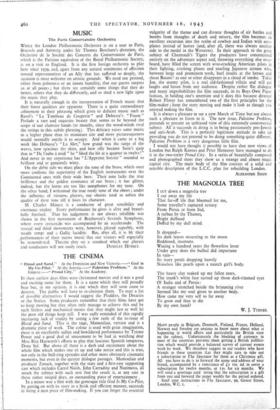MUSIC
The Paris Conservatoire Orchestra
WHILE the London Philharmonic Orchestra is on a tour to Paris, Brussels and Antwerp under Sir Thomas Beecham's direction, the Orchestre de la Societe des Concerts du Conservatoire de Paris, which is the Parisian equivalent of the Royal Philharmonic Society, is on a visit to England. It is the first foreign orchestra to play here since 1939, and, apart from any natural sentiments of affection toward representatives of an Ally that has suffered so deeply, the occasion is most welcome on artistic grounds. We need not pretend, either from politeness or an innate humility, that our guests surpass us at all points ; but there are certainly some things that they do better, others that they do differently, and so shed a new light upon the music they play.
It is naturally enough in the interpretation of French music that their finest qualities are apparent. There is a quite extraordinary refinement in their phrasing which gives to delicate music such as Ravel's "Le Tombeau de Couperin" and Debussy's " Faune " Prelude a rare and exquisite beauty that seems to be beyond the scope of our clumsier hands (or mouths, since the wood-winds rival the strings in this subtle phrasing). This delicacy raises some music to a higher plane than its miniature size and mere picturesqueness would normally entitle it to occupy. And when it came to a big work like Debussy's "La Mer," how grand was the surge of the waves, how spacious the skies, and how silly became Satie's quip that in" De l'aube a midi" he "liked the bit at a quarter to twelve!" And never in my experience has " L'Apprenti Sorcier " sounded so brilliant and se genuinely witty. On the debit side we must place the tone of the brass, which once more confirms the superiority of the English instruments over the Continental ones with their wide bore. Their tone lacks the true brilliance and the golden resonance of our brass ; it has glitter, indeed, but the horns are too like saxophones for my taste. On the othei hand, I welcomed the true reedy tone of the oboes ; under the influence of virtuoso players, our oboists tend to soften the quality of their tone till it loses its character. M. Charles Munch is a conductor of great sensibility and enormous vitality. Every performance he gives is alive and beauti- fully finished. That his judgement is not 'always infallible was shown in the first movement of Beethoven's Seventh Symphony, where every crescer.do was accompanied by an accelerando. The second and third movements were, however, played superbly, with steady tempi and a Gallic lucidity. But, after all, it is laSr their performances of their native music that our visitors will especially be remembzred. Therein they set a standard which our players and conductors will not easily reach. DYNELEY HUSSEY.






























 Previous page
Previous page